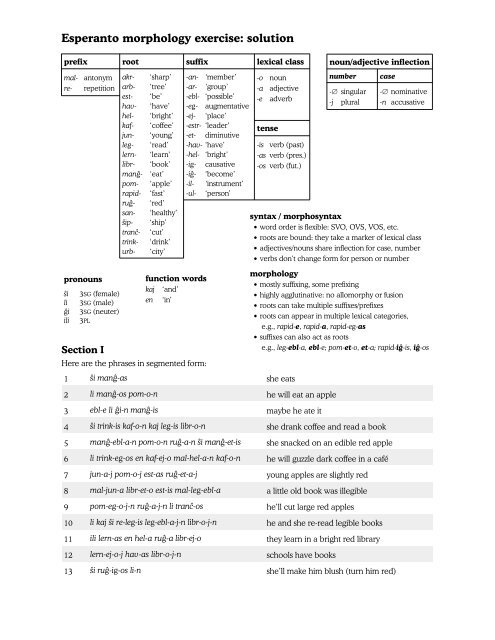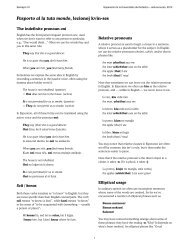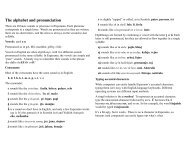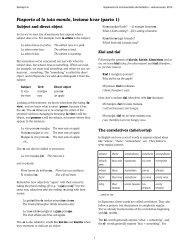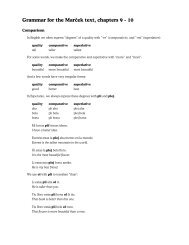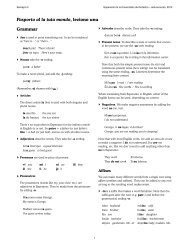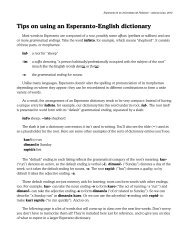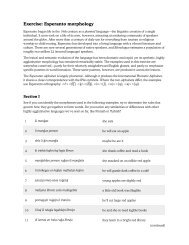Esperanto morphology exercise: solution - Lodestone
Esperanto morphology exercise: solution - Lodestone
Esperanto morphology exercise: solution - Lodestone
You also want an ePaper? Increase the reach of your titles
YUMPU automatically turns print PDFs into web optimized ePapers that Google loves.
<strong>Esperanto</strong> <strong>morphology</strong> <strong>exercise</strong>: <strong>solution</strong><br />
prefix root suffix lexical class<br />
mal- antonym<br />
re- repetition<br />
pronouns<br />
ŝi 3SG (female)<br />
li 3SG (male)<br />
ĝi 3SG (neuter)<br />
ili 3PL<br />
Section I<br />
akr- ‘sharp’<br />
arb- ‘tree’<br />
est- ‘be’<br />
hav- ‘have’<br />
hel- ‘bright’<br />
kaf- ‘coffee’<br />
jun- ‘young’<br />
leg- ‘read’<br />
lern- ‘learn’<br />
libr- ‘book’<br />
manĝ- ‘eat’<br />
pom- ‘apple’<br />
rapid- ‘fast’<br />
ruĝ- ‘red’<br />
san- ‘healthy’<br />
ŝip- ‘ship’<br />
tranĉ- ‘cut’<br />
trink- ‘drink’<br />
urb- ‘city’<br />
function words<br />
kaj ‘and’<br />
en ‘in’<br />
Here are the phrases in segmented form:<br />
-an- ‘member’<br />
-ar- ‘group’<br />
-ebl- ‘possible’<br />
-eg- augmentative<br />
-ej- ‘place’<br />
-estr- ‘leader’<br />
-et- diminutive<br />
-hav- ‘have’<br />
-hel- ‘bright’<br />
-ig- causative<br />
-iĝ- ‘become’<br />
-il- ‘instrument’<br />
-ul- ‘person’<br />
-o noun<br />
-a adjective<br />
-e adverb<br />
tense<br />
-is verb (past)<br />
-as verb (pres.)<br />
-os verb (fut.)<br />
1 ŝi manĝ-as she eats<br />
2 li manĝ-os pom-o-n he will eat an apple<br />
3 ebl-e li ĝi-n manĝ-is maybe he ate it<br />
4 ŝi trink-is kaf-o-n kaj leg-is libr-o-n she drank coffee and read a book<br />
5 manĝ-ebl-a-n pom-o-n ruĝ-a-n ŝi manĝ-et-is she snacked on an edible red apple<br />
6 li trink-eg-os en kaf-ej-o mal-hel-a-n kaf-o-n he will guzzle dark coffee in a café<br />
7 jun-a-j pom-o-j est-as ruĝ-et-a-j young apples are slightly red<br />
8 mal-jun-a libr-et-o est-is mal-leg-ebl-a a little old book was illegible<br />
9 pom-eg-o-j-n ruĝ-a-j-n li tranĉ-os he’ll cut large red apples<br />
10 li kaj ŝi re-leg-is leg-ebl-a-j-n libr-o-j-n he and she re-read legible books<br />
11 ili lern-as en hel-a ruĝ-a libr-ej-o they learn in a bright red library<br />
12 lern-ej-o-j hav-as libr-o-j-n schools have books<br />
noun/adjective inflection<br />
number case<br />
-∅ singular<br />
-j plural<br />
13 ŝi ruĝ-ig-os li-n she’ll make him blush (turn him red)<br />
-∅ nominative<br />
-n accusative<br />
syntax / morphosyntax<br />
• word order is flexible: SVO, OVS, VOS, etc.<br />
• roots are bound: they take a marker of lexical class<br />
• adjectives/nouns share inflection for case, number<br />
• verbs don’t change form for person or number<br />
<strong>morphology</strong><br />
• mostly suffixing, some prefixing<br />
• highly agglutinative: no allomorphy or fusion<br />
• roots can take multiple suffixes/prefixes<br />
• roots can appear in multiple lexical categories,<br />
e.g., rapid-e, rapid-a, rapid-eg-as<br />
• suffixes can also act as roots<br />
e.g., leg-ebl-a, ebl-e; pom-et-o, et-a; rapid-iĝ-is, iĝ-os
14 eble jun-ul-o ruĝ-iĝ-os perhaps a youngster will blush<br />
15 en mal-hel-a arb-ar-o est-as arb-eg-o-j mal-jun-a-j big old trees are in a dark forest<br />
16 et-a-j tranĉ-il-o-j est-as akr-a-j small knives are sharp<br />
17 mal-akr-a tranĉ-il-et-o mal-rapid-e tranĉ-as pom-o-j-n a dull small knife cuts apples slowly<br />
18 ebl-e li akr-ig-os ĝi-n maybe he will sharpen it<br />
19 ĝi iĝ-os akr-a it will become sharp<br />
20 manĝ-ej-o hav-as manĝ-il-o-j-n a lunchroom has cutlery<br />
21 manĝ-il-ar-eg-o a big set of eating utensils<br />
22 mal-rapid-a ŝip-o rapid-iĝ-is a slow ship sped up (became fast)<br />
23 li rapid-eg-as he’s (going) really fast<br />
24 ŝi est-as rapid-ul-o she’s a speedster<br />
25 ŝip-estr-o mal-rapid-ig-o-s rapid-a-n ŝip-o-n a captain will slow down a quick ship<br />
26 rapid-a-j ŝip-eg-o-j re-mal-rapid-iĝ-os big speedy ships will slow down again<br />
27 eg-a-j urb-o-j hav-as urb-an-o-j-n big cities have urbanites<br />
28 urb-eg-o hav-as urb-estr-o-n a metropolis has a mayor<br />
29 estr-ar-o hav-as estr-ar-an-o-j-n a government has government-members<br />
30 tranĉ-il-eg-o-j-n hav-as ŝip-an-o-j crewmen (of ships) have big knives<br />
31 manĝ-et-as pom-o-j-n san-a-j urb-an-o-j healthy urbanites snack on apples<br />
32 pom-o re-san-ig-os mal-san-ul-o-n an apple will make a sick person better<br />
33 mal-san-a-j lern-ej-an-o-j san-iĝ-is sick students became healthy<br />
34 ili re-san-iĝ-is en mal-san-ul-ej-o they recovered in a hospital<br />
Section II<br />
The suffixes each produce a new stem that has some relation to the root:<br />
-ul a person<br />
characterized by<br />
something<br />
-ant a person (agent)<br />
involved in an<br />
action<br />
-ist a person in a<br />
profession<br />
Section III<br />
jun-ul-o<br />
young-person-N<br />
‘youngster’<br />
kur-ant-o<br />
run-agent-N<br />
‘a runner’<br />
dent-ist-o<br />
tooth-profession-N<br />
‘a dentist’<br />
-an a resident, or<br />
member of a<br />
group<br />
-il a tool or<br />
instrument<br />
a town (small city): urb-et-o il-ar-o: a set of tools, “tool kit”<br />
ebl-ig-os: will make possible, will facilitate a ship’s crew (as a group): ŝip-an-ar-o<br />
schoolmaster: lern-ej-estr-o re-akr-ig-as: resharpens<br />
mal-san-eg-ul-o: a very sick person manĝ-iĝ-is: became eaten, was eaten<br />
trink-ebl-a: drinkable dent-ar-o: a set of teeth<br />
a fleet (of ships): ŝip-ar-o et-eg-a: very small<br />
urb-an-o<br />
city-resident-N<br />
‘an urbanite’<br />
komput-il-o<br />
compute-tool-N<br />
‘a computer’


